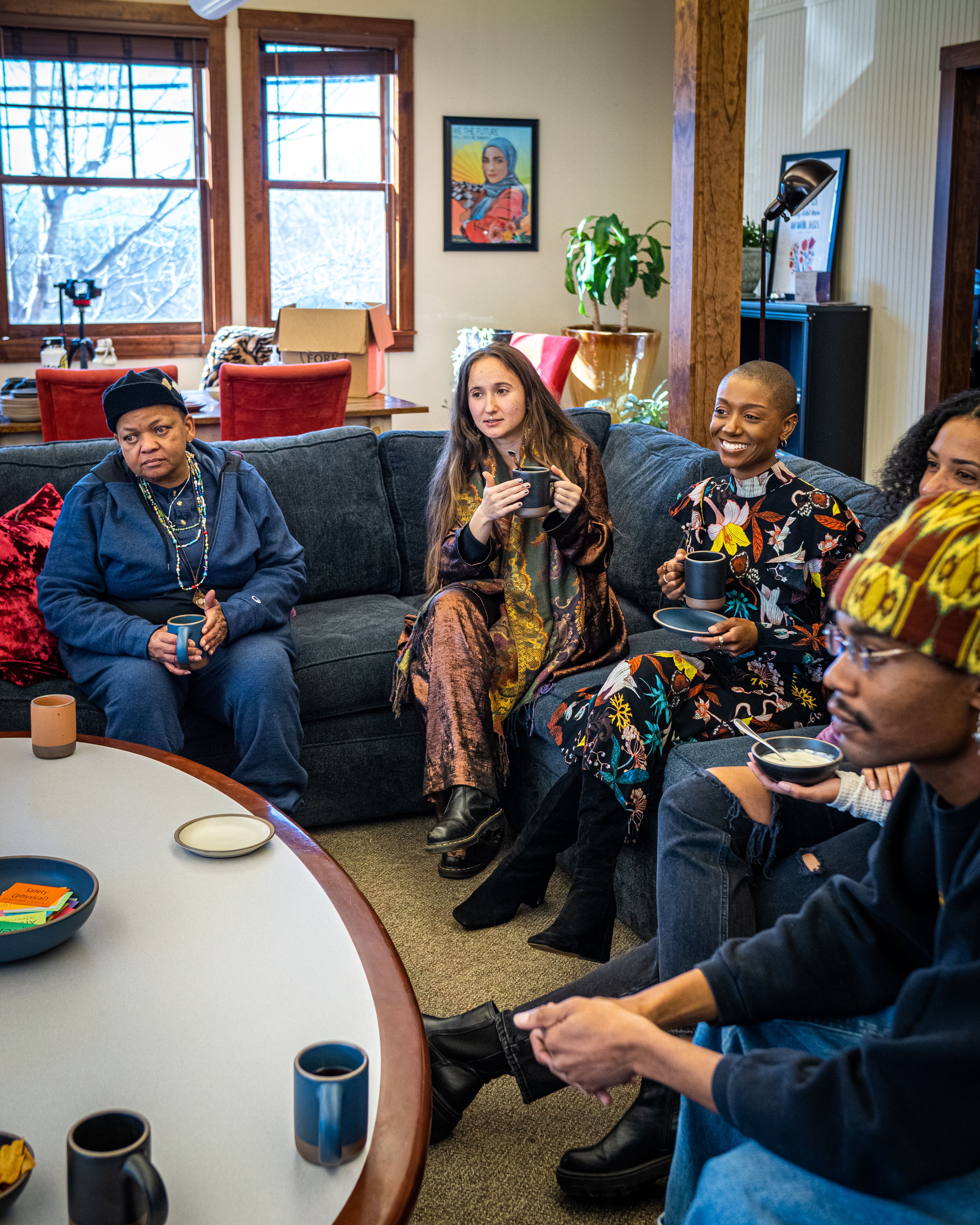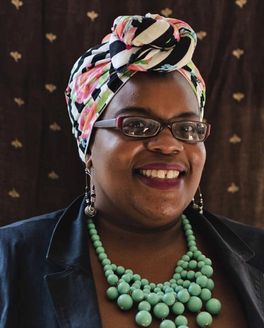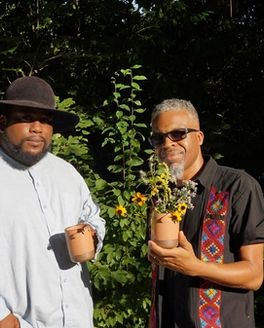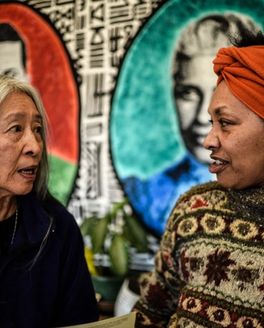
Reparations and Reimagining Home
We’re excited to introduce our Quarterly Community Partner, the Racial Justice Coalition (RJC), based in Asheville, North Carolina, where East Fork calls home. Our Community Impact Manager, Davia Young, and Copywriter, Jasmin Morrell, sat down for a chat with RJC to hear their vision for thriving communities, the far-reaching impacts of urban renewal and Asheville’s current housing crisis, reparations, and the inherent power of the communities who speak out for collective liberation.
*And a big thanks to Donnie Bishop and Patrice Audette, Team East Fork folk who also showed up to support this story
In 2014, when police murdered a teenager named Michael Brown in Ferguson, Missouri, Asheville community leaders thought to themselves, this could happen here. And, what are we going to do about that?
Asheville, North Carolina, home to the Biltmore Estate, multiple James Beard nominated restaurants, and the ruggedly beautiful Blue Ridge Mountains, is a haven for tourists seeking both luxuriously restorative experiences and the thrill of outdoor adventure.
But for the people who live in Asheville year-round, particularly those who identify as Black, the city can be a difficult place to call home. Currently, Asheville has the highest cost of living out of any North Carolina city, rivaling other larger Southern cities like Charlotte, Atlanta, Dallas, and Charleston, but with comparably fewer amenities. If you’re Black, and your family has lived here for generations, chances are your prospects for home ownership are slim. Beginning in the ‘70s, the city of Asheville implemented a strategy called Urban Renewal, one that led to the destruction of Black neighborhoods and businesses, and crippled the opportunity for the generation of generational wealth through land and home ownership. Pushed into public housing, the effects of poverty in the Black community are still playing out today.
“As someone who's an [Asheville] native and comes from a [family of] multi-generational natives of this town…the general nature of growing up here, the whole thing was to leave,” Mike Holmes told us as we sat down across a table from each other.
Mike is the Canvassing Director for the Racial Justice Coalition (RJC), an organization birthed in the aftermath of Michael Brown’s murder and the subsequent uprisings in Ferguson.
“You can't even fathom the amount of wealth that has been lost,” Mike notes.
Inside the downtown Asheville office where the RJC team works, artwork featuring BIPOC folk cheer the walls. A large, enticing sectional couch dominates the space, and books like Isabel Wilkerson’s Caste: The Origins of Our Discontent, and Rez Life: An Indian’s Journey Through Reservation Life, sit on the bookshelf. It’s clearly designed to be a space of belonging, a safe workplace where self care is encouraged, and nourishment is essential to the work.
RJC’s work is multi-faceted, a gem meant to cut to the heart of the matter: in a city with a steadily-declining Black community, what could Black thriving look like?
“The first thing that comes to mind for me is resources,” Erin Barksdale, RJC Outreach and Engagement Director, says. “It feels like every time we're out in community and having conversations around what thriving would look like, it's around just having access to resources and that being things like land, a culturally relevant education, financial literacy, just a lot of different ways to access information and resources.”
Erin and Mike’s words wash over us like waves. They take turns sharing RJC’s story, piecing together the backdrop for the work their team engages in the wider community and within themselves. Currently, there are 18 organizations listed on RJC’s website that form the coalition, nonprofits like Democracy North Carolina and the ACLU of Western North Carolina. Their united mission is a powerful one, a commitment to addressing systemic racism and state-sanctioned violence against Black people and those most impacted by poverty, criminalization, and mass incarceration. And RJC does this through grassroots-led organizing and community collaborations, where they seek to achieve and sustain deep equity by building power with the historically underrepresented, dismantling policies and institutions that uphold racism, and reimagining a community where justice exists for all people.
Justice for all people. It’s a daunting goal, but it’s a future that’s worth imagining and dreaming into being.
“I feel like this is a corny phrase, but the sky is the limit. Why not go really large with our vision? I feel like the community has also opened up my eyes to the possibilities,” Erin tells us.
The possibilities are as endless as the mountain peaks rising above and encircling the city, a place nicknamed, “land of the sky.” In a stunning move during the summer of 2020, Asheville was the first U.S. city to commit to a process of reparations for the descendants of enslaved people and residents who identify as Black or African American. The dictionary defines reparations as making amends for causing harm, sometimes in the form of monetary compensation, or otherwise helping those who were wronged. Regarding the city of Asheville, the reparations resolution called for the city manager to, “establish a process…to develop short, medium and long term recommendations to specifically address the creation of generational wealth and to boost economic mobility and opportunity in the Black community.”
In response to the formation of the reparations commission, RJC created the Every Black Voice Campaign, an opportunity for Black community members to provide their own thoughts and feelings around the five focus areas of the commission: economic development, healthcare, criminal justice, education, and housing.
“We’re doing interviews where we go out and survey Black community members around what they want to see,” Erin says, “And we’re going to be putting together a report around what we found. Truly, we’re not speaking for the Black community. We don’t claim to know what the Black community wants, [our community] is not a monolith…We’re trying to lift every single Black voice in Asheville and Buncombe County,”
The interviews conducted by RJC’s team in the Every Black Voice campaign are an unprecedented chance for Black voices to be honored in the public sphere, a moment of historic significance. And though they bear the weight of generational grief, Erin and Mike also rest in the power of the communities they serve.
“It's so vast, but it's just been really beautiful to see that through all of these [interviews], there's so many commonalities. There's so many people with the same solutions, “ Mike says.
“Every time that I’ve been out in the community, I'm like, the power is here,” Erin adds. “We don't even need to build it. It is here. We just have to get it out there…when you ask the community for solutions, they will present solutions. It's a matter of us having the advocacy and representation in the city and county governments to make that happen.”
Harnessing that power and using it to influence legislation is also an RJC project. The Government Accountability Project, or GAP, consists of volunteers who monitor the Buncombe County and Asheville City Council agendas and do their best to flag anything specific to racial equity or racial justice. Then those volunteers alert community members via weekly emails, encouraging them to be in conversation with city council and county commissioners.
It can sometimes feel like grunt work, and the grind of spreading information and in-the-weeds organizing takes its toll. But when weariness threatens them, Mike and Erin dig deep, accessing both stories of community care and their own toolboxes of self care.
“There are so many unsung heroes doing incredible work [who] were never asked to do that work. They're just doing it because that's what you do in a village,” Mike tells us. “Rechelle Mills was my aunt and she was a mother of six. She was just a really brilliant woman. A year before she passed, she was awarded as a nursing assistant at the VA.”
Erin, who doesn’t have family in town, smiles softly as she recalls the way she feels embraced by the Black women in Asheville who have taken her under their wings. “Ms. Bettie Council, Ms. Sophie Dixon, they've really welcomed me and shared a lot of wisdom with me that I'm so grateful for.”
RJC stands in a long line of U.S. movement work and legacy makers, dedicated to making the world a more beautiful and loving place for Black people in the U.S. and beyond. So, we return to gratitude: For those doing healing work, one conversation at a time. For those working to create healthier, safer, communities. For those doing the work to unravel deeply intertwined injustices. For those helping the residents of Asheville imagine spaces of belonging.
A place that Black people can call home.



